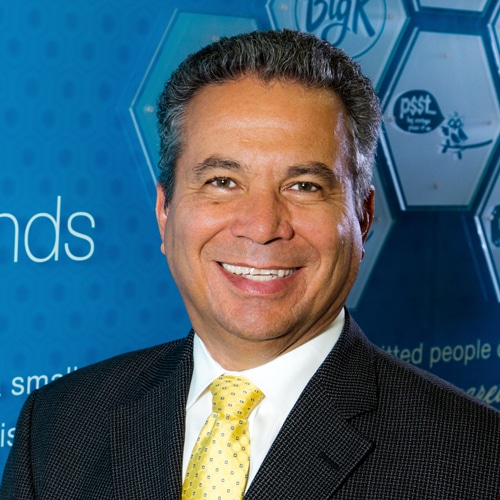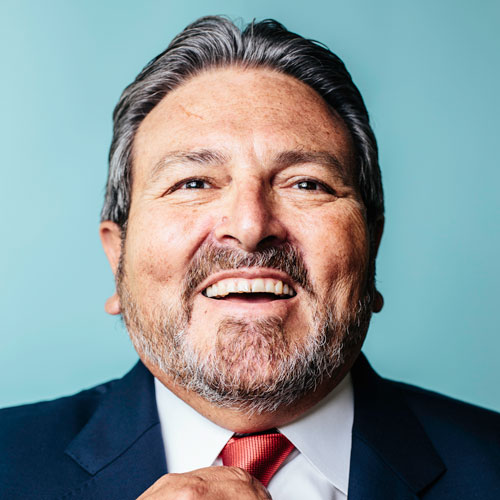Natalie Morales is settling into a new role in Los Angeles after moving from New York, where she had served as a TODAY reporter since 2006. From the epicenter of the entertainment industry, Morales hosts NBCU’s “Access Hollywood” and cohosts “Access Hollywood Live,” while remaining TODAY’s West Coast anchor. The award-winning journalist—whose pieces have hit airwaves from “NBC Nightly News” to “Dateline NBC”—shares her approach to anchoring on the national stage and catches us up on her past few months as a bicoastal broadcaster.
Does your Puerto Rican and Brazilian heritage play into your work?
NM: I’m as Latina as they come, but I try not to wear my identity on my sleeve. Most important, it’s about the integrity I carry in the job. I never wanted to be typecast. Early on, the idea was that if you were diverse, you had an edge in the media. I don’t think that necessarily is the case anymore. What has helped me is my language abilities; I speak both Spanish and Portuguese. I’ve been able to use that skill set to talk to people, to break barriers, to connect with people that maybe otherwise wouldn’t have a voice.
What attracted you to broadcast journalism?
NM: I love the creativity with the visual side of TV. When I worked at News 12 in the Bronx, I used to shoot and edit my own pieces. I love sitting in the edit room and being out in the field when you can figure out all the elements that go into a story. We write a lot of our own pieces [on NBC]. At the Olympics in Rio, I helped to produce the stories as well. You’ve got to be able to just go. You have to be a good talker, smart, think fast on your feet, and be naturally curious, and have good work ethic. If you have those skills, you’ll do well in any job, really.
Of all the stories you’ve covered, which stand out the most?
NM: The Chilean miner story. I was there for twenty days during the rescue. That defined for me what it means to be a reporter. Working the field, connecting to the families, and telling the story from a point of view that the American audience didn’t always get to see.
Or when I went to Honduras for a story about the lobster diving industry. There were poor Mosquito Coast indigenous people who were diving to great depths without proper gear equipment to prevent injury. Then they would come back with severe bends that often led to paralysis. A lot of people may not realize that when you’re buying spiny-tail lobster from the Caribbean, many Honduran people are risking their lives to get it.
How is your West Coast life treating you?
NM: I’m still learning. Tomorrow I’m doing both shows, so I have to be in at 3:30 in the morning. But I’m having so much fun and working with incredible teams. Living on the West Coast is something I’ve always wanted. Growing up as an Air Force brat, I lived all over the world. But never here. I had this glamorous image of LA—the weather, laidback-ness of people, the mountains, the beaches. Now I can give my kids the chance to enjoy the outdoors year-round.
Are your media habits evolving with your new role at “Access”?
NM: I have to drive into work now [as opposed to NYC], so on the car ride in, I listen to TODAY on XM 108. I still read voraciously—the New York Times, New York Post, and Daily News. But now, because I’m in the entertainment industry, I have to be caught up on E!, TMZ, and Huffington Post. There was always sort of a guilty pleasure in “The Bachelor,” but now I watch those shows as part of my job. I’m still not on Snapchat; I’ve downloaded it, but I’m not really sure how to use it yet.
NATALIE MORALES’S HABITS FOR SUCCESS
STRIKE A POWER POSE
“I stand for two minutes every day with my arms stretched out as far as they’ll go. I learned about this power pose from Harvard professor Amy Cuddy. It helps stretch out the back, and your confidence shoots up. It’s also a little meditation prayer—my way of thanking God for all that I have in life.”
RISE AND SHINE
“I always eat a good breakfast. I’m a big believer in powering up to start my day. And I admittedly drink lots of coffee to keep me going.”
FIND ZEN MOMENTS
“When I start getting stressed, I close my eyes, breathe deeply, and count to ten.”
HIT THE PAVEMENT
“Running is my therapy. Anytime I have a problem or burden, if I go for a long run, I figure it out, or at least appease my mind.”
WIND DOWN
“When I get home, I look for a chance to do something for me—anything fulfilling that can take me out of work mode.”

